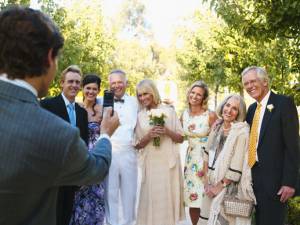
When it comes to wedding gift-giving, there are many ways you can commit an accidental etiquette misstep, so knowing some basic guidelines can help.
Your upcoming wedding is a celebration. Sure, your ceremony carries with it importance and perhaps an air of dignity. Yet your reception is the time for your friends and family to make merry, and naturally, they may want to give you a gift. When it comes to wedding gifts, there are so many ways you can commit an accidental etiquette misstep. Knowing some basic guidelines can help you avoid embarrassment and offense.
Handling Gift Registry Details
Before you receive your first gift, you’ll need to create a wedding registry or two. You have many options from which to choose, but Martha Stewart Weddings suggests limiting yourself to a couple of different providers. Also, your gift registries should be completed between two and six months before the big day. However you proceed, remember that registry information should never be printed on your invitations. Your inner circle can spread the details through word-of-mouth, and you can post them on your wedding website. Just make sure that you include a clickable link and list the specifics on another page deeper in your site.
Is Asking for Cash a No-No?
Experts have been divided on whether asking or registering for cash is an acceptable practice. Thankfully, Anna Post from the Emily Post Institute offers some definite guidance. Registering for cash gifts is perfectly fine, but you should follow the same guidelines for publicizing it as you do for traditional registries. Let your family and friends spill the details, and be sure to have a standard registry as a backup. Not sure what to add to the alternate registry? Try some unique items you don’t already have, but offer a few low-cost gift options as well.
Brides writer Jaimie Mackey echoes the advice of never asking for cash on the invitation. She adds that you should be explicit about how you plan to use monetary gifts, whether it’s for a new home, a cross-country move, or your honeymoon. You can discuss these details on your wedding website if you wish. Don’t forget to provide a box for checks and gift cards at your reception, since some guests may bring these with them. Have a trusted individual check the box throughout the evening and securely store the contents to prevent theft.
Other Pitfalls To Avoid
You’ve followed all this great advice, but you’re still not home free. You’re probably not the type of couple that keeps score on gifts, but Wedding Wire Canada’s Diane Hall reminds readers that this is a major faux pas. After all, gifts aren’t an obligation, and The Knot sets the record straight on the “cover your plate” rule. On the flip side, you could encounter guests asking how much you’re spending per plate on your wedding to guide them in gift-giving. In those cases, you may need to deflect the question and stress that you value their company more.
While you’re at it, don’t neglect those all-important thank-you notes. Hall mentions that registry providers usually send you notifications when items have been purchased. You’ll want to send out your notes within three weeks of receiving each gift. For presents given to you on the big day, you should send out your notes within three months.
Don’t Proceed Without a Plan
Wedding gifts are a way for guests to show their affection and care for a happy couple. If you’re the ones tying the knot, graciousness and discretion are your best friends. First, count on your closest family and friends to let others know about your registry. Don’t be afraid to register for cash, but include some physical goods to provide your guests with alternatives. Finally, send out your thank-you notes in a timely manner. These tips should help you navigate the world of wedding gifts before and after the big day.



